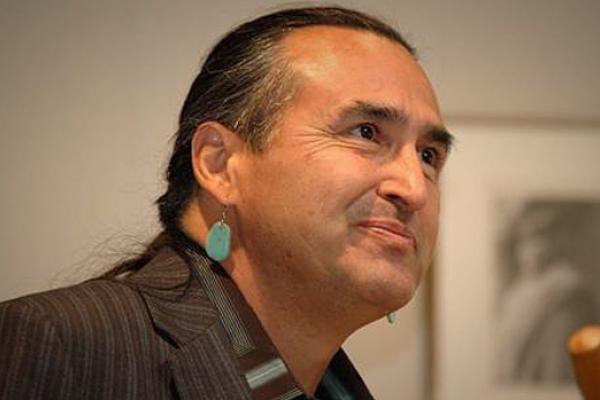It was one week ago that I received the email I had been dreading. On Feb. 6, 2013, while in Washington, D.C., for the National Prayer Breakfast, Richard Twiss suffered a major heart attack. He remained in a hospital in the D.C. area for several days as friends and family rushed to his side. But on Feb. 9, at the age of 58, Taoyate Obnajin, he Stands with his People, crossed over to meet the Creator. He is survived by his wife Katherine and his four sons Andrew, Philip, Ian, and Daniel.
If you ever had the privilege of meeting Richard Twiss, chances are he invited you somewhere. Richard was an incredible host. I remember last summer I attended a symposium for the North American Institute for Indigenous Theological Studies, of which Richard was a board member. No sooner had I walked through the door when I was greeted by Richard and asked if I would like to join their drum circle up front to start the next session. I felt extremely honored by this invitation and gladly accepted. I am not a trained theologian nor am I a prolific powwow drummer, but this small gesture immediately made me feel at home and communicated that I was welcome there and was given a voice should I have something to contribute.
Richard was involved in many conversations. As a follower of Jesus, president and co-founder of Wiconi International, as well as an accomplished author, he was a highly sought after speaker and a true bridge builder between Native and non-Native communities.
In the complex and controversial dialogue of contextualizing Christian worship for American Indian cultures, Richard Twiss allowed himself to become a lightening rod so that boarding school survivors and assimilated American Indian Christians could have the freedom to put on their regalia, pick up their drums, and ask the question "What does it mean to be Native American and follow Jesus?"
Richard's unique ministry gave many Native people the opportunity to experience that Jesus is not just the "White man's God" but he came for all people from every language and every culture.
There are many challenges facing American Indians today in the United States: unemployment, broken families, alcoholism, diabetes, violence, poor education, and the list goes on and on. But after living with my people on the Navajo reservation for the past decade, I have come to the conclusion that the biggest challenge facing American Indians is the reversal of our roles in this land these past few centuries.
Turtle Island, i.e., North America, is our home, and we are indigenous to these lands. We can tell you stories about why this mountain is here or why that river flows there. Our Creation stories take place in this land, and for centuries we did not see ourselves as its owners, but rather as its hosts.
That role began to change more than 500 years ago when a European explorer, Christopher Columbus, got lost at sea. He was met by our ancestors, but then promptly returned to his home, claiming to have "discovered" a new land, minimizing the fact that it was already inhabited by millions. He soon was followed by wave after wave of pilgrims, refugees, and immigrants, who flocked here, fueled by a Doctrine of Discovery and driven by a presumptive sense of manifest destiny. The result of this history was that the indigenous peoples of North America were either killed, assimilated, or marginalized. Those who survived were stripped of their role as host and instead made to feel like unwanted guests in someone else's home.
But there is a remnant, a precious few, who do not believe or live into this lie. They are not driven by anger, resentment, or even bitterness, but by an understanding that as Native peoples, we are the hosts of this land. And they conduct themselves as such.
Richard Twiss was one of these people.
Throughout his life he joined, participated in, initiated, and invited people to many conversations. He traveled around our nation and the world investing freely in relationships with people and leaders from various ethnic communities, churches, denominations, academic institutions, and governmental agencies. In every instance that I observed, he brought an increased awareness of Native peoples and invited our "nation of immigrants" to take further steps into an understanding of, and relationship with, their indigenous hosts.
Feb. 9 was a sad day for me personally. I lost a friend, a colleague, and a brother that day. But it was also a sad day for our nation because with the passing of Richard Twiss, Turtle Island lost a leader. Richard was not an elected official, nor was he the head of a huge institution. But he was a true host of this land: building bridges, starting conversations, increasing understanding, and inviting nearly everyone he met into something new. He conducted himself in such a manner that many who met him walked away from the interaction feeling a little more at home.
It is my hope, that as Native peoples, we can follow Richard's example and re-embrace our roles as the host people of Turtle Island.
A public "Celebration of Life" service commemorating Richard Twiss will be held on March 10, and further details will be published on the Wiconi International website: Here.
Mark Charles is the son of an American mother (of Dutch heritage) and a Navajo father. He lives with his family on the Navajo Reservation and seeks to understand the complexities of our country's history regarding race, culture, and faith in order to help forge a path of healing and reconciliation for the nation. (Twitter: @wirelesshogan, Web: wirelesshogan.com)
This article originally appeared at Native News Network.
Got something to say about what you're reading? We value your feedback!
